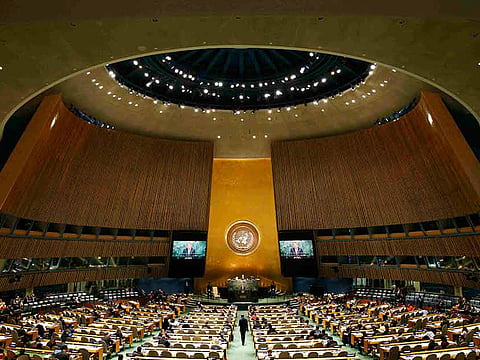United Nations at 70: Time for a relaunch
Despite some remarkable achievements, the world body is now a tarnished brand that needs fixing

Welcome to the Gulf News Debate. This month we have two of our leading opinion writers arguing on the relevance of the United Nations as the organisation celebrates its 70th anniversary. For the contrasting view to this article, that the fundamentals are still strong, click here
There’s a big birthday bash as the United Nations turns 70, but as yet it’s unclear who’ll be buying the cake. If recent history is anything to go by, the Russians and Chinese will veto the baker, or at least try to sell him some weapons, the Americans will balk at the cost and invade the bakery, an overpaid bureaucrat will put the thing on expenses and peacekeepers will burn themselves on the candles. As for the flavour, it’s bound to be a fudge.
Alas, the UN system, born in a spirit of Never Again in 1945, is not ageing well: A security council that seems to deal only in magnifying insecurity; peacekeepers who can’t keep the peace; a health body that failed in the face of an epidemic; staffers either paralysed by power and internal politics, or else growing nicely prosperous on six-figure salaries and some of the most grotesque per diems in the world; daft directorates like the UN Office for Outer Space Affairs; a publishing arm that spends millions each year printing thousands of reports on subjects such as State of the World’s Midwifery 2014 and Broadband in Latin America — Beyond Connectivity. And above it all, a byzantine, unaccountable, inscrutable, alphabet soupocracy of 85,000 people that has spent half a trillion dollars over the past 70 years, a significant portion of it on its own bureaucratic needs.
This is not a personal rant — it’s an aggregation of the frustrations of scores of UN staff, past and present, who spoke to the Guardian as part of a new series on the utility of the world body.
The organisation is feeble at probing its own failings. Investigators are toothless patsies; whistleblowers are ostracised, even fired. The UN refuses to submit to freedom of information requests, drawing a veil of unaccountability over its inertia and inadequacies. And even where it delivers services that save lives, it does so expensively; independent aid agencies often argue that they could do it cheaper.
But perhaps the saddest thing about the UN is the way that its tarnished brand undermines the heroic work done by so many people in its name. People like Rezk Rezk, a refugee resettlement officer and a volunteer who is only paid living expenses, to the great shame of the obscenely salaried suits in New York and Geneva. People like Zabulon Yoti, an Ebola expert who moved to Sierra Leone last summer to try and stop the disease in its tracks. People like Georgette Gagnon, who is trying to hold coalition troops and Taliban forces to account for the deaths of people they claim to be fighting for.
People like the Unicef team in Yemen, trying to vaccinate children; the UNHCR staffers helping the unprecedented numbers of human beings trying to enter Europe this year; the World Food Programme relief teams who saved lives after the Nepal earthquake.
The UN’s agonising indecision over Syria is just one of a succession of stalemates that show up its irrelevance
It would be unfair not to cite examples of the UN’s remarkable achievements over the past 70 years: The defeat of smallpox and guinea worm; the millions of lives saved by vaccinations, refugee workers and food aid; the vast improvement in maternal and neonatal health encouraged by the millennium development goals; the brave attempt to do something about climate, ozone, oceans and forests before it is too late.
The UN says it has negotiated more than 170 peace deals, kept the peace in 60 countries, and fostered democracy in 40. Less obviously, it has kept hideous military tech from the hands of brutes, scouring battlefields for landmines and burying ideas like “sight-blinding lasers” and robotic warfare before they can become a deeply troubling reality. But these achievements come in spite of, not because of, the institution itself.
And it’s not as if we don’t know what needs fixing. The security council, constructed in the 1940s, is no longer fit for purpose. Its agonising indecision over Syria is just one of a succession of stalemates that show up its irrelevance. The vetoes enjoyed by the permanent five — Britain (Britain!), France, China, Russia and the US — must be replaced by a majority voting system that empowers smaller nations. Peacekeepers must be rolled into a standing force of professionals, not an ad hoc assemblage of underpaid uniforms taking a breather from their own killing fields back at home.
The entire system of agencies must be streamlined, so we no longer have up to six different units — with six different bureaucracies — dealing with a single issue. The selection of the secretary general, which comes around again next year, must become transparent and democratic, not a secretive coronation by the permanent five.
The budget must be addressed — and not by the hundreds of tax-free diplomats who spend all year in New York negotiating it. UN spending has doubled over the past decade, quadrupled since the mid-1990s. In 1945, the organisation spent $20 million (Dh73.56 million). In 2015, the UN and all its countless arms and affiliates will spend 2,000 times as much. It’s true — if we didn’t have the UN, we’d have to invent it. But if we invented it, surely we wouldn’t invent it like this.
— Guardian News & Media Ltd



